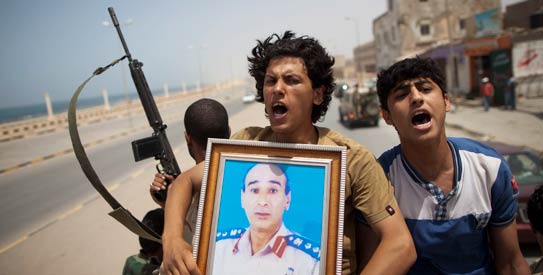
DUBAI: The apparent indifference of young Arabs to the killing of Osama bin Laden is being seen as a sign of Al-Qaeda's flagging popularity and the preoccupation in the Middle East with revolutions at home.
An Egyptian expert on Islamist movements, Diaa Rashwan, said his killing by US troops has failed to provoke Arab street protests because they are already marching for freedom.
“The death of bin Laden does not mean much to the Arab people,” Rashwan said, noting the Middle East was awash with revolutions to topple longtime autocratic rulers.
Bin Laden’s elimination was “a natural development at a time when people are turning the page on guns and violence that targeted civilians indiscriminately,” he said.
The death of Al-Qaeda's leader marked the end of an era.
With his popularity already on the decline, the Saudi-born militant “would not have even enjoyed the media coverage he has had now if he had been killed a bit later,” said Rashwan.
This week has not seen any major popular protest, neither at the announcement of bin Laden's death nor over the disposal of his body at sea.
Washington says it opted for a sea burial out of concern that a traditional funeral could have produced a shrine for bin Laden, who topped the most wanted list for the past decade since the 9/11 terror attacks.
President Barack Obama announced that US forces shot dead bin Laden early on Monday local time after tracking him down to a hideout at Abbottabad near the Pakistani capital.
Sporadic street rallies have been held in support of bin Laden in Afghanistan and Pakistan where the Al-Qaeda chief spent most of his life, but no such events have been reported in the Middle East.
Forums on the Internet, however, have been active in hailing his contribution to radical Islam.
Salman Shaikh, director of Brookings Doha Centre, said the absence of sympathy for bin Laden was not surprising. “The Arab world moved a long time ago from Al-Qaeda ... The Arabs are instead moving towards popular revolts,” he said.
“They are focusing more on the struggle to have their own freedom. And besides that, they want to get rid of the extremists. They want to move forward and look to the future.”
Shaikh said Arabs did not want to be identified with or viewed as “terrorists,” despite mixed feelings of denial and disbelief among loyalists who insist bin Laden lives on.
The youth, at the forefront of the so-called Arab Spring, is focused on freedom, democracy and higher living standards, agreed Lebanese sociologist Dalal Bizri, although this did not mean a total lack of sympathy for bin Laden.
A leader of Al-Qaeda's branch in Yemen on Wednesday vowed revenge.
“We will take revenge for the death of our Sheikh Osama bin Laden and we will prove this to the enemies of God,” he told AFP, contacted by telephone from Yemen's restive southern province of Abyan, an Al-Qaeda stronghold.
“They will see what they haven't expected ... We are preparing a plan to continue jihad in the coming period,” the militant warned, requesting anonymity for “security reasons.”
Bizri said movements in the Arab world were increasingly influenced by the Turkish model of rule in a secular state, with the Muslim Brotherhood in Egypt and Syria more amenable to the West and abandoning anti-Western slogans.
Since Egyptian president Hosni Mubarak's ouster in February, the formerly banned Muslim Brotherhood has formed a non-theocratic” party in Cairo to contest up to half of the parliamentary seats in September elections.
“The main feature of the coming period will be the involvement of Islamists in power, and they will then fight against extremists and silence them,” predicted Bizri.
Egypt's Brotherhood itself said on Monday that “Islam is not bin Laden.”
“After September 11, there had been a lot of confusion. Terrorism was mixed up with Islam,” said Mahmud Ezzat, the Brotherhood's number two. “In the coming phase, everyone will be looking to the West for just behaviour.”













































Dear visitor, the comments section is undergoing an overhaul and will return soon.